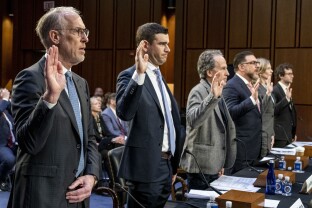President Joe Biden convened two dozen top officials at the White House last week to strategize on how to strengthen competition in the market.
“Capitalism without competition is not capitalism, it’s exploitation,” the president said. “And we’re taking it on.”
Days later, he signed a bill undercutting that message.
The so-called “minibus,” the must-pass bill to keep the federal government open, made numerous spending tweaks, one of which quietly reduced the money the Department of Justice would be able to spend on antitrust enforcement in the year ahead. Now, lawmakers and the Biden administration are scrambling to fix the issue.
The change, which was negotiated behind closed doors, shocked antitrust proponents. That’s not only because it runs counter to lawmakers’ pledges to crack down on monopolies or because the Justice Department is expected to file a major antitrust lawsuit against Apple in the coming weeks. The surprise is also because Congress itself overwhelmingly passed a bill just two years ago that was supposed to give antitrust enforcers a much-needed infusion of cash.
The negotiators behind the spending bill have kept details private — so private that some insisted they didn’t even know what had happened.
“I wasn’t involved in that,” Sen. Susan Collins, the leading Republican on the Senate Appropriations Committee and one of the bill’s lead negotiators, said, directing NOTUS to talk with other negotiators.
Rep. Rosa DeLauro, ranking member of the House Appropriations Committee, blamed spending caps. “There’s a cap, which we have to abide by, and if the fees go up over the cap, that money goes to 2025.”
DeLauro’s opponents say that’s fuzzy math. Two dozen lawmakers wrote a letter to the appropriators asking them to restore the funding and criticizing the Appropriations Committee’s view of the law.
The limit on spending “reverses decades of precedent on how the Antitrust Division is funded,” the letter said, and could set a “harmful precedent” going into the future.
The minibus imperiled “the viability of future cases, including that which might stem from the reported investigation into anticompetitive behavior by Live Nation-Ticketmaster,” the letter said.
Some lawmakers said they didn’t see much mystery behind what happened. The appropriators negotiating spending “saw a pot of money there that was a honeypot for them to go and spend it someplace else without any consideration,” Sen. Chuck Grassley told NOTUS. “The money’s needed, no doubt about it.”
Sign up for the latest from NOTUS.
Grassley was a leading co-sponsor of the Merger Filing Fee Modernization Act, a wonky-but-significant 2022 bill that raised fees collected by the Department of Justice from corporate mergers and allowed the department to keep that money and spend it on antitrust enforcement. Such Justice Department lawsuits are a cornerstone of antitrust policy; Congress passed the bill with bipartisan support.
The new law represented a meaningful update to antitrust enforcement at a time when the Biden administration and many lawmakers were trying to get serious about cracking down on corporate power, especially in Big Tech. The Department of Justice’s investigation into whether Apple has put limits on its technology, making it hard for software rivals to compete on iPhones, could culminate in charges as soon as this month.
Proponents of antitrust enforcement point out companies like Apple have significant power.
“Everybody knows that big corporations around here spend quite a bit of time and treasure trying to keep the economy the way it is, which is really working for the biggest companies and the top 1% and not for everybody else,” Rep. Greg Casar, a progressive who signed the letter. “I get why some of the biggest companies in the world don’t like antitrust enforcement. That’s part of the point.”
The Department of Justice is poised to bring in $278 million in 2024 from merger fees, the Congressional Budget Office estimated, a welcome increase from the previous year. However, in the new minibus, lawmakers set the spending level for antitrust enforcement at $233 million — a small increase from 2023.
Congress’ current appropriations process — in which top lawmakers negotiate sweeping funding bills in secret, which are then often voted on at the last possible moment — is also a powerful policymaking tool, capable of undermining even new and bipartisan laws. Because the minibus was released shortly before a funding deadline and lawmakers needed to pass it to avert a government shutdown, there was no time to negotiate changes, lawmakers told NOTUS.
“We wrote a letter to [the appropriators], and it was too late to get the money back,” Grassley said. “They issued the bill, and if we had amended the bill and been successful — which I think we could have been — then the bill would have had to go back to the House, the House wasn’t in session, the government would’ve shut down.”
The incident has set off a scramble on Capitol Hill and at the White House to restore the funding in the short and long term.
A White House official told NOTUS that Biden will work to take the funding out of lawmakers’ hands altogether by making it “mandatory” spending, which is not subject to year-by-year spending levels so that the antitrust division won’t “face a risk limitations imposed through the congressional appropriations process in future years.”
Lawmakers are also discussing changing the spending in the next minibus bill, which must be passed by March 22, two lawmakers said.
Those negotiations, again, are happening behind closed doors.
“I’m not going to talk about private conversations,” said Sen. Elizabeth Warren when asked about potential changes. “And boy, this is about private conversations.”
—
Maggie Severns is a reporter at NOTUS. Casey Murray is a NOTUS reporter and an Allbritton Journalism Institute fellow.
Sign in
Log into your free account with your email. Don’t have one?
Check your email for a one-time code.
We sent a 4-digit code to . Enter the pin to confirm your account.
New code will be available in 1:00
Let’s try this again.
We encountered an error with the passcode sent to . Please reenter your email.



